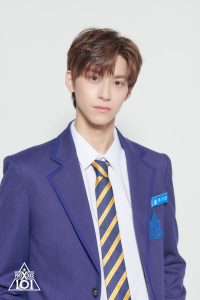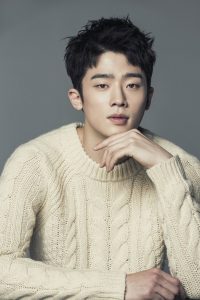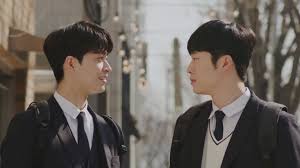
Where Your Eyes Linger has been marketed as South Korea’s first LGBT drama, or more accurately, South Korea’s first BL (Boys’ Love) drama — but that’s debatable. Depending on how you define BL, South Korea does indeed give fans the occasional BL drama; or has given at least one more that I have watched, Long Time No See (2017). However, it is true that there isn’t much Korean BL out there.
Instead, Thailand, Japan, and Taiwan are the popular destinations for BL offerings. China too has given us BL, and after the success of The Untamed (2019), many BL works are being adapted into bromanantic dramas, shows that merely hint at a homosexual relationship between the leads.
It is precisely because they’re so rare that it would be a shame to miss the chance to discuss Where Your Eyes Linger. The show stars Produce X 101 contestant Han Gi-chan, as Han Tae-joo, a high school-aged chaebol heir, and a relatively unknown actor Jang Eui-soo, as Kang Gook, Tae-joo’s same-aged long-time bodyguard. With eight episodes of roughly 10 mins each, Where Your Eyes Linger is an easy, breezy watch. But is a good, satisfying watch? Yes, and no. I can’t quite decide.
With its short run time, the show leaves little to no time to develop nuanced, complex characters, or depict any form of character development. Instead, it relies solely upon two hooks: On Han Gi-chan and Jang Eui-soo to showcase chemistry and tension, the kind that hooks the viewer and leaves her (or him/them) wanting more; and on the promise of a satisfactory resolution to the angst. Sadly, it’s hard to decisively say that it delivers. As both a K-drama and a BL drama, it’s easy to find other shows to compare it against, and the comparison comes out lacking. At the same time, K-dramas venturing into BL territory, a space previously almost completely ignored, is not an unwelcome development.
Of the two hooks, the show tackles the first with much success. From it’s earliest episodes, there’s real, tangible, palpable tension between the leads. Clearly they feel something for one another, even if they don’t know what it is. Tae-joo provokes, and Gook reacts, but no matter what happens, they stay together.
The delicate equilibrium they’ve established is shaken when a female classmate, Choi Hye-mi (played by Choi Kyu-ri) takes an interest in Kang Gook, and he reciprocates. Faced with the possibility of “losing” Gook, Tae-joo’s teasing intensifies and Gook grows increasingly uncomfortable.
This push and pull between Tae-joo and Gook forms the core of the tension between them. While it can be true of any show of the romance genre, it carries an added layer of angst in Where Your Eyes Linger owing to the fact that both leads are male. To put it bluntly, it adds an extra element of “thrill” for the viewer — which, without going into everything problematic about BL, is where part of the appeal of the genre lies. In this case, it’s a believable portrayal of someone testing the waters, when you don’t know if the other person might also be attracted to someone of the same sex (and to you), and you dare not ask.
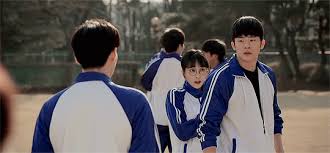
As is obvious from the plot description, Hye-mi is used to push their feelings out into the open. Although Hye-mi can see their mutual interest, she pursues Gook anyway. This could have been annoying because we see this trope too often in BL: women characters are demonized for the sake of the male leads. However, Hye-mi is a straightforward and direct person and accepts Kang Gook’s decision once he finally makes up his mind between her and Tae-joo. To its credit, the show spends time on Hye-mi and the relationship with her mother and gives her as much personality as it does the male leads. She comes across as likable and trustworthy, quite unlike what the BL trope dictates.
Under this backdrop, the two leads stare after one another with longing, unsaid words and unasked questions burning in their eyes. With the daily judo sessions, with them sleeping on one bed each night, and with Gook’s clear instructions never to look away from Tae-joo, the tension is as thick as ice. Kudos must be given to Han Gi-chan and Jang Eui-soo for holding their own. Aided by a playful OST, the actors convey volumes through their gazes. The 30-year-old Jang Eui-soo is surprisingly believable as a high-schooler; and idol Han Gi-chan, who makes his acting debut with this drama, shows he has potential as an actor. For a rookie, his confession in Ep. 6 is particularly well done.
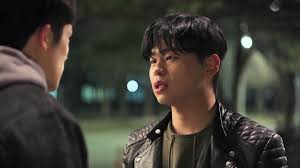
However, the show stumbles on the second of the two hooks, and fails to deliver on the promise of the early episodes. The finale (Ep. 8) scene is disappointingly short, and marred by a glaring plot hole: Even if Tae-joo’s father separated the boys and sent Tae-joo to England, it’s unclear why they couldn’t keep in touch via social media. If Tae-joo is still in touch with their mutual friend, Pil Hyun (is he really a friend after what he did?), then why not also Kang Gook?
With Pil Hyun’s help, the two meet again at the very end of the show, after having spent three years apart. These three years are glossed over quickly so that while the characters may have spent them apart, viewers are not given that same sense of time, and the dramatic potential is wasted. Instead, the emotions reach their peak on the night of their separation, during Gook’s fight to see Tae-joo one last time. Clearly, the story is about them coming to terms with their love for one another, and not about them actually coming to be together — so far so good, the show does well.
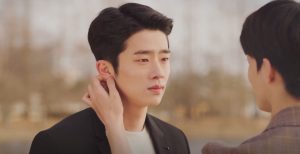
However, given the heightened emotions, their short reunion scene is underwhelming — even more so for a viewer who watched the show live and waited for four weeks on a mere 20 mins a week. Especially disappointing is the fact that it gives us a non-kiss. After all that time apart, they can only touch their lips together and…freeze? This type of non-kiss leaves one wondering about the sincerity of the production, and its resolve to tackle BL. One understands that this is new territory for K-dramas and that South Korea remains a conservative country; yet given the strides K-dramas have made with respect to their characters expressing desire (see e.g. Hyena (2020)) and how unashamedly BL dramas from other countries showcase it (see e.g. Thailand’s Why R U? (2020)), one wants more effort from the leads’ sole kiss.
This raises the question: Should fans overlook the show’s shortcomings merely because it is one of South Korea’s first forays into BL? It certainly looks like they already have. For instance, at the time of writing this review, the show is rated 8.8/10 on My Drama List; and this rating is overly generous. The drama has benefited from the quality of South Korean production, but as it stands in its current form, it’s a simple, uncomplicated story that as a hetero romance may not have been rated so high. BL fans’ expectations from South Korean productions have so far been little to non-existent, and this is reflected in the show’s reviews.
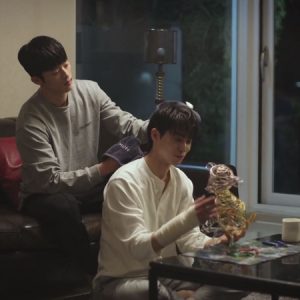
At the end of the day, Where Your Eyes Linger wastes its potential because of a lack of time to tell the story it wants to tell. This could have been a very good drama even with just four full, hour-long episodes. Enough to develop the characters, give them a story, ambition, and lives outside of the leads’ romance, and flesh out their personalities beyond their feelings for one another.
However, despite this criticism, the show has raised my hopes. There is much that is problematic with BL, including the fact that it exploits gay characters for the commercial benefit, and viewing pleasure, of straight people. At the same time, the genre can be great in opening up people’s minds to non-hetero relationships. As a fan, I’d love to see K-dramas pick up BL storylines, but only so long as they’re handled with sensitivity and sincerity. Without this, it may be best for South Korea not to become yet another country venturing into problematic BL waters at all. In fact, more queer media, and showcasing nuanced gay characters in regular K-dramas, would in any case be the better option.
(YouTube, Images via Mnet, Viki)
